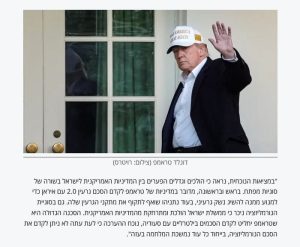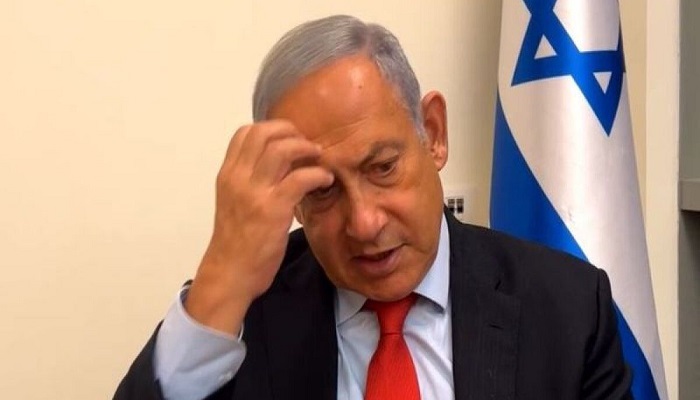PNN – In light of the upcoming visit of the US President to Saudi Arabia, the head of the Middle East Department at Reichman University of Herzliya, in an interview with Ma’ariv, reported the increasing political gap between the Zionist regime and the US, as well as the regime’s sense of serious danger.
According to the report of Pakistan News Network, ahead of US President Donald Trump’s visit to some countries in the region, which will take place in about a week, Ma’ariv Newspaper spoke with Shai Herzliya, head of the International and Middle East Department at the Institute for Politics and Strategy at Reichman Herzliya University and former director general of the Israeli Ministry of Strategic Affairs, about Trump’s visit and its consequences for the Israeli regime.
According to Ma’ariu’s report, in this interview regarding Trump’s trip to some countries in the region, Herzog stated: After Trump’s trip to Rome to attend the funeral of Pope Francis, this is Trump’s second trip outside the United States.
He emphasized that this visit in a way demonstrates the great importance the US President attaches to the Persian Gulf countries, saying: During his first presidential term, Trump also traveled to Israel during his first trip to Saudi Arabia. But this time, at least at this stage, he is not going to come to Israel. Zoi added: This move by Trump, given the deadlock in negotiations with Hamas, shows that he sees no particular benefit in traveling to Israel.
Read more:
Zionist Minister: We will occupy Gaza; we will not retreat even with a prisoner exchange agreement
He also said in this interview: Trump’s visit to some Gulf countries, as is evident in his activities on the global stage in general, demonstrates his foreign policy priorities and the promotion of economic cooperation. Zoi added: The US president is expected to sign large contracts for the sale of advanced weapons systems during his visit to Saudi Arabia, and this may threaten the military superiority of the Israeli army (regime).
In addition, Trump may respond positively to calls from Saudi Crown Prince Mohammed bin Salman to develop a civilian nuclear program. However, while it is unclear whether the nuclear deal would include the development of uranium enrichment capabilities on Saudi soil, this is a potential risk for Israel.
In an interview with Ma’ariv, Reichman, the head of the Middle East department, warned that these agreements would lead to a nuclear arms race throughout the Middle East, and in this regard, countries such as Egypt and Turkey would not be willing to be left behind in military nuclear weapons.
According to Herzog, the Zionist regime is currently facing a major obstacle to normalizing its relations. On the one hand, bin Salman has set two important conditions for advancing this agreement: ending the Gaza war and providing a political horizon for the Palestinians. On the other hand, since the start of the Gaza war, the people of this country have shown increasing opposition to normalizing their relations with Israel.
Therefore, as long as Israeli Prime Minister Benjamin Netanyahu refuses to take action to implement both conditions, the Saudis will oppose any possible platform for normalization. In this regard, due to the sensitivity of the Saudi people and the Arab world, Saudi officials have even conveyed messages to the White House that Trump should refrain from raising this issue in negotiations with Saudi Arabia during his trip.

Zoi said: In the current reality, the gap between US and Israeli policies on a number of key issues appears to be widening. Trump’s insistence on advancing the nuclear deal negotiations with Iran and his refusal to pursue the process of normalizing relations with Arab countries clearly indicate that Israel is distancing itself from US policy.
Furthermore, given the ongoing war in Gaza and the impossibility of normalizing relations with Saudi Arabia, Israel faces a very large and significant risk from Trump’s decision to advance bilateral agreements with Saudi Arabia on its nuclear program.
According to the head of the Middle East Department at Reichman University, however, Israel is faced with a very difficult dilemma; on the one hand, the Zionist regime is faced with the option of ending the war, freeing the remaining 59 prisoners, and deepening the strategic alliance with Arab countries, and on this path, the regime can focus the greatest threats against Iran by returning to the path of strategic and comprehensive power.
On the other hand, Netanyahu’s decision to continue and expand the war in Gaza will lead to Israel losing the momentum of normalizing its relations with Arab countries and, by sinking into the Gaza quagmire and a long war with no clear end, destroying the possibility of freeing Israeli prisoners.
Considering these issues, Zoi warned about the future of the Zionist regime and emphasized that the regime must now take its first step, its most urgent and important action in this regard.

